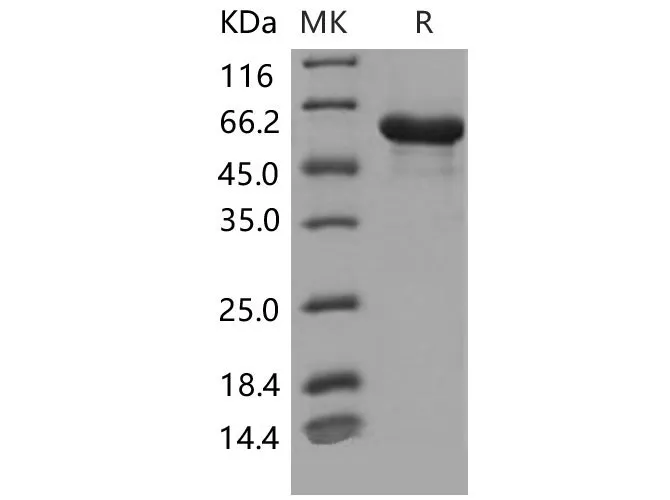Recombinant Mouse HSPD1/HSP60 Protein (His Tag)
CAT:
763-PKSM040589
Size:
100 µg
Price:
Ask
- Availability: 24/48H Stock Items & 2 to 6 Weeks non Stock Items.
- Dry Ice Shipment: No




Recombinant Mouse HSPD1/HSP60 Protein (His Tag)
- Background: HSPD1, also known as HSP60, is a member of the chaperonin family. HSPD1 may function as a signaling molecule in the innate immune system. This protein is essential for the folding and assembly of newly imported proteins in the mitochondria. It may also prevent misfolding and promote the refolding and proper assembly of unfolded polypeptides generated under stress conditions in the mitochondrial matrix. HSPD1 gene is adjacent to a related family member and the region between the 2 genes functions as a bidirectional promoter. Several pseudogenes have been associated with this gene. Mutations associated with this gene cause autosomal recessive spastic paraplegia 13.Defects in HSPD1 are a cause of spastic paraplegia autosomal dominant type 13 (SPG13). Spastic paraplegia is a degenerative spinal cord disorder characterized by a slow, gradual, progressive weakness and spasticity of the lower limbs. Defects in HSPD1 are the cause of leukodystrophy hypomyelinating type 4 (HLD4); also called mitochondrial HSP60 chaperonopathy or MitCHAP-60 disease. HLD4 is a severe autosomal recessive hypomyelinating leukodystrophy. HSPD1 is cinically characterized by infantile-onset rotary nystagmus, progressive spastic paraplegia, neurologic regression, motor impairment, profound mental retardation. Death usually occurrs within the first two decades of life.
- Synonyms: 60kDa, Hsp60
- CAS Number: 9000-83-3
- UniProt: P63038
- Accession Number: NP_034607.3
- Host: E. coli
- Origin Species: Mouse
- Tag: N-His
- Sequence: Leu 2-Phe 573
- Purity: > 95 % as determined by reducing SDS-PAGE.
- Bioactivity: Not validated for activity
- Reconstitution: Please refer to the printed manual for detailed information.
- Molecular Weight: 58 kDa
- Shipping Conditions: This product is provided as lyophilized powder which is shipped with ice packs.
- Storage Conditions: Generally, lyophilized proteins are stable for up to 12 months when stored at -20 to -80°C. Reconstituted protein solution can be stored at 4-8°C for 2-7 days. Aliquots of reconstituted samples are stable at < -20°C for 3 months.
